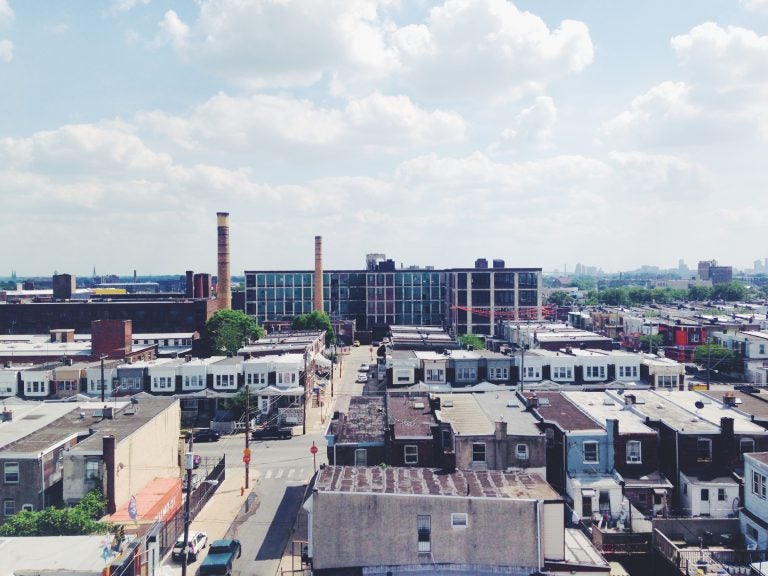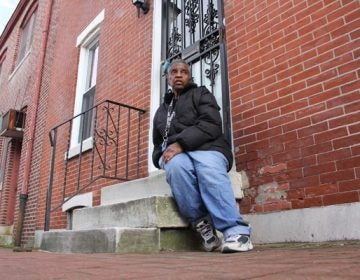Recent court ruling opens a door for homeowners to appeal tax bill
When Ruokai Chen saw his real estate taxes jump up in 2016, the actuary with a degree from the Curtis Institute of Music decided to do some digging.
Listen 2:40
An aerial view of Ruokai Chen's Kensington neighborhood. (Jon Geeting/PlanPhilly)
Taxes and lawsuits are unpleasant things. Most of us would prefer to avoid them all together and begrudgingly pay an accountant or lawyer to handle them if we must.
Most of us aren’t Ruokai Chen. When Chen saw his real estate taxes jump up in 2016, the actuary with a degree from the Curtis Institute of Music decided to do some digging. Using the Office of Property Assessment (OPA) website, he compared his property’s assessment with his neighbors’ and noticed something funny. So he appealed pro se — no lawyer — and took his fight all the way from OPA to the Board of Revision of Taxes (BRT) to the Court of Common Pleas, where he won, saving himself about $450 a year in taxes.
And that January victory could mean that thousands of other homeowners like him — homeowners taking advantage of the ten-year tax abatement who recently saw the assessed value of their property’s land increase while the total value remained the same — might be able to knock a few hundred dollars off their real estate tax bills, too.
What Chen noticed was that his home’s land value had gone up considerably compared to the improvement value. A property’s assessed value — the city-ordained estimate that’s used to calculate real estate taxes — is made up of two components: the value of the land, and the value of the improvements upon the land, i.e. the building. For instance, a shack that’s falling apart in a nice part of town may have a total assessed value of $500,000, with a land value of $490,000 and an improvement value of $10,000. A mansion in the middle of nowhere could have the same assessed value with the land and improvement values flipped.
Chen’s home was brand new when he bought it in 2015, making him eligible for the city’s ten-year tax abatement. Under that controversial development incentive, property owners don’t have to pay taxes on the value of their improvements for a decade. It effectively zeroes out the value of a renovation or addition.
But abated properties still have to pay taxes on the land value. And when OPA reassessed all of Philadelphia’s residential properties in 2016, many saw their land values increase, but not the total property value. According to a 2016 Pew Charitable Trusts report, 58 percent of the 579,447 parcels in the city saw land values increase. But, “for the vast majority of them, the total property value did not change; increased land valuations were offset by decreases in the assessments of the structures.”
When OPA reassessed all city parcels in 2016, the aim was to correct a problem with the prior citywide reassessment in 2012, the Actual Value Initiative, which some complained assessed land too low compared to improvements. After the second assessment, Pew reported that 23,157 residential properties, or about four percent, saw their property taxes increase because of the land value shift. (That excludes properties that saw their taxes rise because their entire property value went up.) At the time, there were 6,762 properties that saw taxes increase because while they were taking advantage of the ten-year tax abatement, their and land assessments rose even as the overall property values remained the same. (There were 15,118 abatements in effect at the time.) The median increase in taxes then was $480 — about the same increase that Chen saw.
While those numbers are no longer up to date, they provide a general idea of how many properties may be able to challenge the assessment on their land values alone.
After the 2016 assessment, the city kept Chen’s total property value at the same price he bought it for a year prior — no problems there. But his land value jumped significantly while the improvement value dropped. At the same time, Chen says, plenty of properties near him — properties that weren’t taking advantage of the ten-year abatement — didn’t see a similar increase in their land values. Two doors down from him, an older property twice as large as Chen’s yielded a land assessment half as big.
“As I looked into this a little more, it became apparent that there was just some inconsistencies, which led me to start the process for an appeal,” said Chen.
Chen decided to appeal just the land assessment, seeking to see it decreased and the value of his improvements increased.
OPA denied his initial appeal, so Chen went to the BRT. At his BRT hearing, Chen says, the city argued that he could not appeal just the land value. “What their attorney said was the Board does not have the power to hear these types of appeals,” said Chen. The BRT agreed and denied Chen’s appeal again. So he decided to appeal again, this time to the Court of Common Pleas. When the city ordered another assessment in preparation for the trial, Chen asked the assessor to separate land value and improvement value in his report. That report appraised the land at about 30 percent less than what was on Chen’s tax bill.
But at Common Pleas, Judge Gene Cohen reversed and ordered Chen’s land value decreased from $113,150 to $79,000 in 2017 and $82,000 in 2018.
“The judge indicated that this was an issue of first impression before the court, which was one of the reasons I didn’t want to settle,” said Chen. If the city tries to raise his land values, again and again, argues that the BRT can only hear appeals to a property’s total value, not its individual parts, Chen will have the order on hand to prove otherwise. Chen believes many other homeowners like him had their appeals denied by BRT on the same argument that Judge Cohen rejected — that BRT can only hear appeals about a property’s total market value, the value of just the land.
BRT Executive Director Carla Pagan doesn’t deny that many homeowners appealed after the 2016 assessments and lost. “State law says that the Board can set the market value or adjust the market value at an appeal hearing and in most of the cases where people specifically had land arguments, most of the appeals, where they just challenged land, but they were satisfied with their overall assessment – most of those appeals were denied,” she said.
But, according to Pagan, it isn’t the BRT’s policy to deny appeals that challenge land value, but not overall value, as a matter of law. “The board has made decisions that impact land value only, and they’ve done that on more than one occasion.”
“Thousands and thousands of people appealed for tax year 2017 — angry, specifically, about their land value increases. And most of those cases were actually denied,” Pagan said. “I’m not saying they were denied because the Board said, ‘Oh we can’t.’ Those cases were mostly denied on the merits.”
If every homeowner in Chen’s situation appealed like he did and won, it could cost the city upwards of $5 million a year in lost property revenues, 55 percent of which goes to the School District. Mayor Jim Kenney called for a six percent property tax increase on Thursday. If the tax hike moves forward, it would be Philadelphia’s fifth increase in the last decade as the city continues to struggle to cover the school district’s rising charter costs and pension obligations.
WHYY is your source for fact-based, in-depth journalism and information. As a nonprofit organization, we rely on financial support from readers like you. Please give today.






